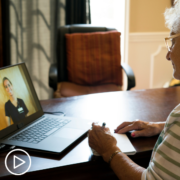Could a Clinical Trial Be Your Best Treatment Option?
Could a Clinical Trial Be Your Best Treatment Option? from Patient Empowerment Network on Vimeo.
Is participating in a clinical trial a last resort or could it be your best treatment option? Dr. Matthew Davids explains the clinical trial process and what’s involved in patient participation.
Dr. Matthew Davids is the Associate Director of the CLL Center at Dana-Farber Cancer Institute. More about this expert.
See More From The Pro-Active CLL Patient Toolkit
Related Resources

|

|

|
Transcript:
Dr. Matthew Davids
My patients often ask me about clinical trials and whether I think that would be a good fit for them. I think there is, in some cases, a bit of a misconception that clinical trials are a last resort for our patients. And we do have some clinical trials that are exploring brand new mechanisms of a drug that have never been used before.
And in that scenario, I would only recommend a trial like that for a patient who has already exhausted all of the standard options.
But I think that, in my opinion, clinical trials should really be the first best choice for most patients. Because we have many trials in CLL that are using the drugs that are already approved, so we know that they’re gonna be effective. And now, we’re putting them together for the first time in new combinations and in new creative ways that will help to advance the field. And most of the trials we have in CLL are not randomized, placebo-controlled. So, patients know what they’re getting. They’re gonna be getting an effective therapy.
And this is a way that they can really get access to cutting-edge care. I would say when you’re a part of a clinical trial, you have a lot of other eyes watching you. In addition to your oncologist and the infusion nurses, for example, you also have research coordinators, research study nurses. Some centers have additional scheduling staff that helps with the clinical trials. So, it’s really a way to get excellent quality clinical care, often getting access to cutting edge treatments.
And so, here at Dana Farber, for example, we try to have a clinical trial option available for patients at every stage of the disease, so that we have trial options for patients who have never had treatment for their CLL, trial options for patients who have maybe only had one or two prior treatments, and then some of those other more experimental clinical trials for patients maybe who have exhausted some of the other options that are available by the FDA-approved therapies.
So, I’m really a huge advocate for clinical trials. I think that’s how we’ll continue to improve the treatment options for our patients with CLL.










